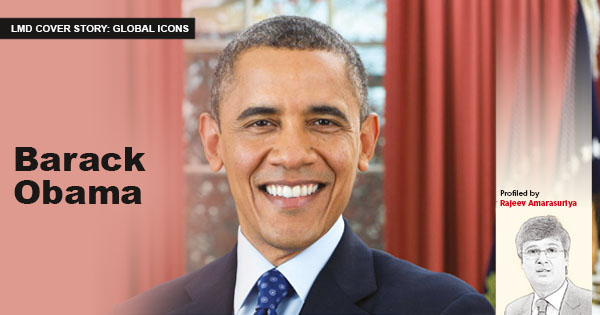
Barack Obama altered the course of history when he became President of the US – and he continues to act as a symbol of hope for millions of Americans who have faced untold discrimination at the hands of their more privileged oppressors. His presidential successor may be termed the ‘Tweeter-in-chief’ (mainly for his frequent social media outbursts) but Obama comes out on top where Twitter following is concerned – such is his enduring global clout, which could prove decisive in this election year. Meanwhile, the Obama Foundation and One America Appeal showcase his philanthropic deeds.
BACKGROUND
DATE OF BIRTH
4 August 1961
BIRTHPLACE
Honolulu (USA)
EDUCATION
BA from Columbia University
Juris Doctor from Harvard University
HIGHLIGHTS
First African-American president of the United States
Instrumental in masterminding the Cuban thaw in 2009
Winner of the Profile in Courage Award in 2017
Won the Nobel Peace Prize in 2009
QUOTE
Nothing can stand in the way of the power
of millions of voices calling for change
Barack Obama
Q: In your opinion, what made Barack Obama a front-runner in statesmanship and politics?
A: While Obama gained prominence for being the first African-American President of the US, several characteristics point to him being a statesman of our era.
Firstly, while policy efficacy and mistakes are debatable, his career was not blemished with the same scandals that plague the office of his successor as well as many other world leaders today.
Obama conformed to a certain framework of what was expected of a leader. His career was defined by excellent PR and charisma, and his decisions were often pragmatic and culturally sensitive. He was a brilliant orator, and his family sustained the dignity and grace of the office.
He also went beyond national interests and positioned himself as a world leader as witnessed in his participation in the Paris Agreement of 2016. Obama was widely perceived to be someone who cared for the wider interests of the world.
Q: What particular lessons can be learned from his career as a statesman – and can Sri Lankan leaders be as revolutionary in their field?
A: He was a hard and focussed leader with manifold talents. There is also a lot to be said from the fact that he did not fall victim to the political divide. Therefore, his opponents might have not agreed with him but they never despised him.
Recognise that being a politician is a national service and you’re elected to serve the people, which should be your priority. It is not a business or any other type of job. Do your best to exceed expectations and realise that it is not a game about staying in power or profits.
If you’re looking to be revolutionary, you must leave something to be remembered by such as societal transformation or overcoming dire circumstances.
Weigh your decisions and always strive to make the morally right choice. While subjective, this will usually guide you. Finally, develop the foresight to predict outcomes and stay ahead of the rest while also seeking to inspire.
Rajeev Amarasuriya




